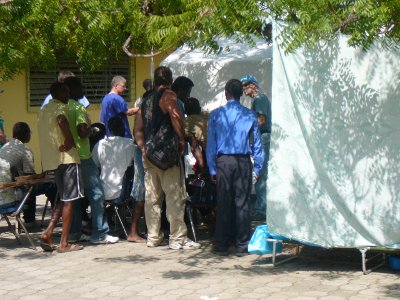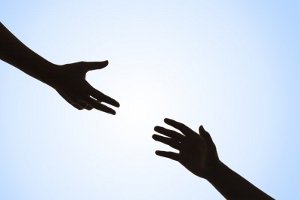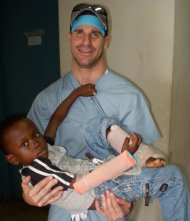Trauma Relief in Haiti: A Report, Part 2

Read Part 1.
Day Three (January 24)
Glad I have a tent. I almost left it, but it provides the only tiny private spot I’ll probably have for the next two weeks. It’s pitched on a slope that is quite rocky and I have a hunch that I’ll become quite familiar with the particular rocks under my tent, negotiating with them for a comfortable sleeping position, me doing all the compromising no matter how contorted my body may end up being to adjust to their inflexible intransigence. Reminds me of a lot of mid-level bureaucrats.
It’s Sunday, the Lord’s Day, and we were awakened at 4:30 this morning by a congregation that is meeting just outside the fence. I didn’t recognize any of the tunes except for one old Gospel song, “Nothing But the Blood of Jesus.” I missed going to church today, but we are too new to the area to even know what is going on so the morning was leisurely spent getting settled in and preparing for a reconnaissance trip with Dr. Charles.
Discussion
Trauma Relief in Haiti: A Report, Part 1
Ten days after the earthquake shook Haiti I was offered a once-in-a-lifetime opportunity to join a shock and trauma team that had access into Haiti through indigenous and wealthy benefactors. The team consisted of three orthopedic surgeons, an ER doctor, a pediatrician, and several nurses. We worked under the auspices of a respected Haitian surgeon who is one of the pillars of the Leogane society. Though this was not a Christian team, I was offered a role as “chaplain” because of my knowledge of the French language and the need for translation service. A “door of utterance” was opened for me to minister to both Haitians and Americans in the city of Leogane, one of the most dramatically affected cities near the epicenter of the January 12 quake. Over the next few weeks I will share with SI readers snippets from my journal containing my observations and opinions about the situation in Haiti.
Day One (January 22)
Entering into Haiti was a surreal experience. Our forty-five-minute charter flight from the Dominican Republic was extended to about two hours because the Port-au-Prince airport that normally handles about nine flights a day (so I am told) is now trying to handle two hundred flights a day. It was deep into the night when we approached. No one spoke; everyone was lost in thought as we gazed out the window of our twin engine plane. Looking down on the city of a couple million souls, one could see very few lights. A black hole of suffering, I thought. And that was before we got here.
Discussion
“The Poor” - Helping without Hurting
 Bryan Chappell of Covenant Seminary asks the question: “How can a local church make a difference, and how do individual Christians meaningfully reflect Christ’s grace when the disparities of wealth and power in our world are so great?”1 As our leadership team begins to lay the groundwork for church planting in Philadelphia, we have had to try to wrestle with this question in a practical way rather than the typical way of theorizing from the relative safety and comfort of middle-class suburbs and seminary classrooms. Located in a transitional urban neighborhood where urban blight meets white flight, we are confronted by challenges regarding our biblical responsibility to the poor. We are not experts in urban ministry and poverty alleviation. We recognize the complexity of the causes of poverty and confess the failure of many Christians, including ourselves, to address and to engage this issue. Some people are born into poverty through no fault of their own and find themselves trapped in an inescapable and infernal cycle. Others fall into poverty as a result of calamity including natural disasters, unemployment, health problems, or traumatic experiences. No easy solutions are forthcoming. Our response must be rooted in the Bible as we seek to lay a theological foundation for our engagement in dealing with societal problems which in reality are spiritual problems.
Bryan Chappell of Covenant Seminary asks the question: “How can a local church make a difference, and how do individual Christians meaningfully reflect Christ’s grace when the disparities of wealth and power in our world are so great?”1 As our leadership team begins to lay the groundwork for church planting in Philadelphia, we have had to try to wrestle with this question in a practical way rather than the typical way of theorizing from the relative safety and comfort of middle-class suburbs and seminary classrooms. Located in a transitional urban neighborhood where urban blight meets white flight, we are confronted by challenges regarding our biblical responsibility to the poor. We are not experts in urban ministry and poverty alleviation. We recognize the complexity of the causes of poverty and confess the failure of many Christians, including ourselves, to address and to engage this issue. Some people are born into poverty through no fault of their own and find themselves trapped in an inescapable and infernal cycle. Others fall into poverty as a result of calamity including natural disasters, unemployment, health problems, or traumatic experiences. No easy solutions are forthcoming. Our response must be rooted in the Bible as we seek to lay a theological foundation for our engagement in dealing with societal problems which in reality are spiritual problems.



Discussion